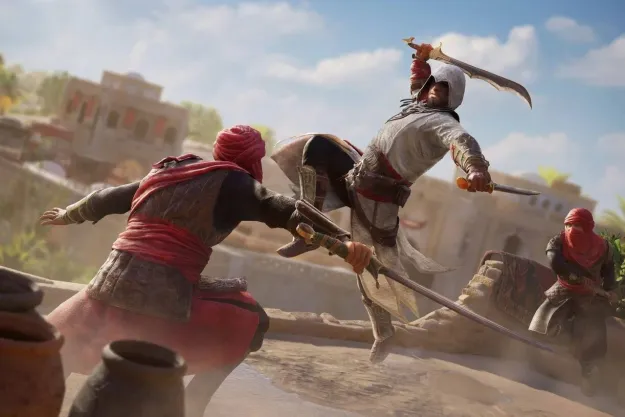
“It’s double the animations, it’s double the voices, all that stuff and double the visual assets,” explained Amancio. When pressed by Videogamer in another interview, technical director James Therein rationalized it as, “not a question of philosophy or choice in this case at all … it was a question of focus and a question of production. Yes, we have tonnes of resources, but we’re putting them into this game, and we have huge teams, nine studios working on this game and we need all of these people to make what we are doing here.”
The gaming community remains unconvinced, however. The hashtag #womenaretoohardtoanimate has rallied their skepticism:
#womenaretoohardtoanimate
“Although we seem ok with animating courtesans and tavern wenches…”— Jonathan Kearns (@BiblioDeviant) June 12, 2014
no one tell ubisoft that indie studios with a fraction of the $ and manpower manage to animate women all the time #womenaretoohardtoanimate
— くコ:彡 (@cuttleboned) June 12, 2014
The #womenaretoohardtoanimate argument only works when you treat women characters as an secondary option rather than the default.
— Adrienne Shaw (@adrishaw) June 12, 2014
More scathingly, fellow developers have jumped into the fray to call BS on Ubisoft’s flimsy justifications. Jonathan Cooper, who now works for Naughty Dog, was animation director for Assassin’s Creed 3 and animation lead on Mass Effect 1 and 2, so he should know a thing or two about the series in particular, and the more general challenges of creating alternate gender avatars. Cooper took to Twitter to debunk Ubisoft’s claims that the additional work required would be unreasonable.
In my educated opinion, I would estimate this to be a day or two’s work. Not a replacement of 8000 animations. http://t.co/z4OZl3Sngl
— Jonathan Cooper (@GameAnim) June 11, 2014
Fun fact #2: Aveline de Grandpré shares more of Connor Kenway’s animations than Edward Kenway does. pic.twitter.com/lFHHnBfLht
— Jonathan Cooper (@GameAnim) June 11, 2014
For those asking “why two days?”, this article explains how retargetting and replacing only key animations works: http://t.co/pQFbe7UJDW
— Jonathan Cooper (@GameAnim) June 12, 2014
The truth of how long it would take to add in alternate avatars probably lies somewhere between Cooper’s one to two days and Ubisoft’s claim of double the work. Getting hung up on the particulars is beside the point, though. Fans seem to be less irked by the exclusion of women from this particular game than the thick-headedness of Ubisoft’s response. Mainstream gaming has a lot of trouble producing protagonists that aren’t white men with short, brown hair, let alone people of genders besides male and races besides white, elf, or dwarf. Ubisoft is doing nothing out of the ordinary by excluding female avatars, and that’s exactly the point. By saying that it is “not a question of philosophy or choice,” the developers are tacitly accepting a status quo where half of the population is only given agency in games as a bonus feature or stretch goal – first on the cutting room floor. The subtle suppression in a lack of representation is far more insidious than any active aggression.
Some might question whether it is fair to hang the burden of an entire industry’s backward attitudes on a single developer. However, if one of the largest studios in gaming with hundreds of employees working around the world with the most powerful hardware that ever existed consider the addition of playable female characters to be too much of a burden, then whom can we expect to do so? As the anger continues to spread virally, we can almost certainly expect a mea culpa from Ubisoft, and probably the addition of women to the next game, if not Unity. Only time will tell, though whether this backlash will actually help to raise more general awareness and discourse, or just be another flash in the pan like so much hashtag outrage.
Editors' Recommendations
- The best video games of November 2023: Super Mario RPG, Assassin’s Creed Nexus, and more
- Assassin’s Creed Mirage ending explained: What happens to Basim, Nehal, and Roshan
- All Assassin’s Creed Mirage outfit locations
- iPhone 15 Pro can natively run the latest Resident Evil and Assassin’s Creed games
- Assassin’s Creed Mirage takes the series back to 2007 in all the right ways


